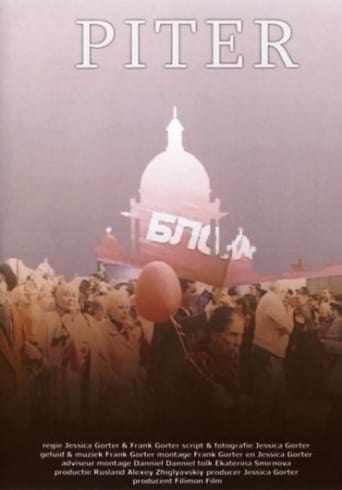Emil Bakkum
The documentary Piter sketches a picture of the daily life in Saint Petersburg, the former Leningrad. The emphasis is on the changes, that have been brought about since the Leninist regime was overthrown in 1992. In that year the Soviet-Union collapsed, and the society disintegrated into a situation which reminds of the former wild west. The pupil wanted a pistol, because the teacher was going to teach him to draw. The documentary uses so-called in-depth interviews, which means that the lives of just a handful of people are studied. Of course this can only give a representative impression, if the producers have indeed selected the proper persons. In the film Piter we are introduced to people from all levels of society: several businessmen, retired people, workers in small jobs, and tramps. After seeing the film I do not know if life in Saint Petersburg is really different than in, say, Louisiana. Nevertheless there are some really Russian moments. For instance, an aged woman still appreciates Stalin, because he ended the illiteracy in Russia. It is almost funny. Show me where Stalin is buried and I will show you a communist plot. And a woman lives in an apartment building with merely one joint kitchen and bathing facility for all residents. In addition they only get cold water, and at fixed times, because the plumbing is too weak. The poverty is apparent. Joke: in a Russian art exhibition one exhibit was the painting of a loaf of bread and a sausage. Everybody wanted to know the artist's name and address. To be fair, it seems that there has been some progress in wealth in comparison with the Leninist era. The real victims of the regime change are probably the outcasts, because the social security has been abandoned. In the end the documentary reports that the tramp has died, because the hospital refused to treat his illness. His doctor gave him six months, but when he couldn't pay the bill he gave him six months more. Patient: Doctor, I have got only 59 seconds to live. Doctor: Wait a minute, please. In summary, Piter gives some insights and moving shots, but refrains from a definite judgment of the changes. If you enjoy surreal situations, then don't miss Piter.
RushRhees
The name of this documentary - Piter - refers to the city of St Petersburg. If my memory does not deceive me, one of the persons in the film tells a story of how she has never grown accustomed to the change of names - for her, Petersburg is still Leningrad.The film consists of interviews with people living in Petersburg, young and old. Some of these clips are very funny - such as the clip when we see a woman/man (it is left unclear, I think) collecting cans. A woman turns to the camera, angrily asking whether the crew has permission to film. She then says that the crew shouldn't be filming the can collector - s/he doesn't give a good impression of "Russians", and, she goes on, growling to the can collector, "at least you could make an effort and comb your hair!" (The can collector is the person of whom I got the most sympathetic and complex picture) In a way, this confrontation sums up the themes of the film - "Russia today - what is it like?" Of course, this is an important question, and at least for me the film was a fortunate attempt to collect some perspectives on Russia, Petersburg - past and present.
